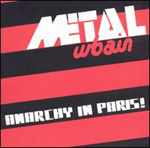|
|
 |
Dusted Reviews
Artist: Metal Urbain Album: Anarchy in Paris! Label: Acute Review date: Feb. 5, 2004 |

|
|
|
 |
Despite having the flagship release on London's Rough Trade imprint, influencing bands such as Big Black and the Jesus and Mary Chain, and inciting at least a couple of concert riots in their hometown of Paris, somehow French punk band Metal Urbain's history and back catalogue have managed to slip through the cracks since their original demise in the early eighties. Having formed during the initial tidal wave of European punk rock in the late seventies and bequeathing only a fistful of singles on an enthusiastic public, the band's music survived courtesy of intercontinental tape trades and rabid fanzine appreciation. In an effort to right what appears to be a criminal lack of knowledge on what was a then-burgeoning French punk set, New York label Acute thus issues Anarchy in Paris!, compiling the whole nine of their discography with a few outtakes and alternate mixes for good measure. While their influence is a bit difficult to gauge based on the sheer unavailability of so much of their work, the disc serves to highlight a group that, had things worked out just a bit differently and with a little more luck, could have been as imitated as staple post-punk acts like Wire, Joy Division, and Gang of Four.
Of course, that's not to say that this oft-shuffled quartet (and trio, for a bit), sounds much like any of the bands already on the hearts, minds, and lips of all participants in the current post-punk rebirth. Metal Urbain focused their attack on a mix of guitars, French sloganeering, and synths, ditching a rhythm section all together in favor of a tinny (but highly effective) drum machine. True to rights, the band always avowed their love of electronic music, pummeling rock, and, of course, Brian Eno's atmospheric synth work. Even still, I have to admit my surprise at hearing the results of their experiments some twenty-odd years ago. Advance press and word of mouth had me expecting a French analogue to bands such as Cabaret Voltaire or Suicide - all tweaked out synths and minimal chord phrasings lurking around in the dark. But at first listen, Metal Urbain gives off the distinct air or minimalists in a maximum setting. Make no mistake about it - for all their avant garde leanings, Metal Urbain wrote some distinct, "shout along until your voice is raw" anthems.
"Panik", "Paris Maquis", and "Hysterie Connective", the A-sides of the first three singles the band released (and also the lead tracks on this compilation) set the tables for much of what followed - a thumping, near motorik beat accompanied by gruff guitar riffs, shouted lyrics, and the occasionally swooping synth line. "Lady Coca Cola", the flip side of their debut offering, switches things up a bit, favoring squalls of guitar noise instead of recognizable riffs, with gurgling synth bleeps pulsating in the background of one of Metal Urbain's more left-field tracks, a tactic the band also explored a bit on the English version of the song "Sweet Marilyn".
While the band only managed to officially release around eight songs on their four official singles, they were still prolific in their efforts to record all of their rehearsals. It is this unreleased material that thus made up the bulk of their posthumously released LP Les Hommes Morts Sont Dangereux. As would be expected, much of this material conforms to the aesthetics established by the releases they managed to issue during their brief existence. "Ghetto", one of the best of these, sports of a high-speed disco beat as a backdrop for one of the catchiest and most aggressive tunes in all of Metal Urbain's oeuvre. Similarly, "Futurama" moves along in the same vein, only this time with a more pronounced backing of electronics. The tracks on here that have never before seen the light of day break with the traditions already established a bit, with the demo version of "Colt 45" toning down the distortion in favor of a more naive sounding guitar line and the by now requisite drum machine pulsing, while "Little Girl of Love" sounds somewhat akin to Vincent Prince fronting the Ramones. "Tango Sudiste" and the instrumental version of "Panik", the former taken from and earlier attempt at a discography called L'age d'or and the latter also unreleased, work themselves into neat electro grooves, continuing in the more experimental vein of the "Lady Coca Cola/Sweet Marilyn" direction, only stripped of guitars and concentrating solely on electronics.
In the early eighties, Urbain's constituent parts headed their separate ways, concentrating on projects like Dr. Mix & the Remix and the Metal Boys (both of whom will see the reissue treatment courtesy of Acute later this year) before lapsing into total obscurity. What the band left behind was a relatively small amount of music and good bit of speculation as to what could have been. Truthfully, listening to the whole seventy-plus minutes of Anarchy in Paris! can be a bit trying at times. The band did indeed record some great songs that didn't deserve to be "lost" for so many years, but the sheer repetitive nature of the second half of the disc makes it a bit hard to take it in anything other than brief installments. Its importance, then, comes more from its historical significance - as a document of a heretofore unheralded scene and evidence that there are probably hundred of bands across the world like this - bands who recorded and performed in the absence of a viable independent network who lapsed in the fringes of punk rock and are thus deserving a bit of their own spotlight. So do Metal Urbain become one of those essential bands to be listed alongside the other members of the post-punk pantheon? That much is doubtful, although the music on here still makes for a great listen.
By Michael Crumsho
|







